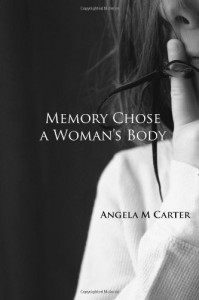
Unbound Content
102 pages, $16.00
Review by Hannah Rodabaugh
Angela M. Carter’s Memory Chose A Woman’s Body is a collection of poetry that deals with the subjects of the author’s abusive childhood, her subsequent problems with mental illness, her southern roots, being a mother, and others. Her poetry, which tends towards the confessional, is viscerally intense, a poetry of extreme images and emotions. Her work is glaringly and uncomfortably honest. However, this honesty is also what reels you in.
Carter writes with grace and elegance about many of the subsequent events of her abusive childhood: neglect, sexual assault, indifferent social workers, molestation, and domestic violence are discussed unflinchingly and eloquently. In “Quiet,” she relates her experience of being molested along with her heartbreakingly futile attempts to speak out against the abuser. She writes:
[A] boy is betting on her not to speak.
He moves into the seat next to her . . .
His hands, uninvited, grope where they shouldn’t . . .The girl, called to the school office,
speaks.
She is told it was a misunderstanding. . . .She returns to the world and the eyes
hands over chest,
whispers clouding her ears,
to hear one particular comment:
It wouldn’t have happened if she wasn’t so quiet.
It is a testament to Carter’s sense of clarity and narrative that she is able to write about these experiences so lucidly. In the poem “I Suppose,” Carter refers back to this experience as a sort of metaphor for the way her childhood was stifled and silenced. She writes:
What began as a back rub one afternoon
became the front rub,
became drilled holes in the walls for easy view,
became doors that would not lock,
became cars that could not be driven,
became me yelling out loud in pastures of no scenery,
became me being pulled into the backseat of a school bus
and shushedwhen I told the principal and the teacher about the boy,
became me losing my tongue,
playing dead
until there was nowhere to play anymore.
Her discussion of the ways people have tried to silence her becomes the leitmotif of the collection. Countless poems similarly reference speaking, the voice, calls and calling, tongues, songbirds singing, throats and other such symbolic language.
Many of her pieces deal with the desire to speak openly, not just about past abuse, but about her struggle with mental illness. Often these poems, which discuss her ambiguous feelings towards medication and how it changes her personality, have an almost Plathian vigor. In “Everyone Looks Calm While Sleeping,” Carter writes:
Swallow the pills at breakfast, lunch, and bedtime
it must be attached like a Siamese memory—neither I
nor the pills have purpose with the other.
Warm mouth or dry capsule,
it no longer needs to scratch away at the crumbs in the alley later at night,
it weeps loudly for all to hear at the kitchen table
or when a visitor opens the cabinet to find a glass for water.
This moving testament to grieving the self that is lost when silenced through medication reminds me of Plath’s “Tulips,” which deals with her stay at an institution. Many of Carter’s pieces on this subject refer back to this stifling of the voice, as the voice, which comes from the self, cannot be present if the self is also absent or somehow dimmed: “Let’s try the blue one, gray one, white one, now the pink. / Put the notebook down, dear girl, misery should not be allowed any ink.” she notes wittily in “The Second Floor.” (Psychologist Kay Jamison’s Touched with Fire: Manic-Depressive Illness and the Artistic Temperament similarly suggests this idea concerning medication and art.)
A part of this collection that caught my eye is the way in which Carter often uses inventive or unusual language. For example, “Positively Negative Pregnancy Test” begins with this moving sequence:
I knew that look you’d give me
straight out of the womb.
I knew you were in there,
a new planet forming
in a desolate universe.
I could feel the craftiness
of skin being formed.
I am fascinated by the line “I could feel the craftiness / of skin being formed.” It is because craftiness can mean a type of wiliness as well as generic references to structure. Another passage which interested me was this unusual sequence at the beginning of “Dusting”:
Emotion should not be treated like a stomach.
It does not growl or heave when it needs. . . .
It can live on nothing at all—
what was never given cannot be craved.
The bulky unwieldiness of comparing a heaving stomach to emotion works strangely in that its lack of lyricism contains its clarity. It’s compelling.
Angela M. Carter’s Memory Chose A Woman’s Body may be unflinchingly honest, but it is also a testament to what that honesty can do when honed with a lyric, supple tongue. Carter’s first collection will reach out to you with its clear intensity, its compounded sadness, and its grounded images. It is viscerally dense, a kind of recollected image that you feel in your gut.
***
Hannah Rodabaugh received her MA from Miami University and her MFA from Naropa University’s Jack Kerouac School. Her work was included in Flim Forum Press’ anthology: A Sing Economy. Recently, her work has been published in Defenestration, Used Furniture Review, Palimpsest, Similar:Peaks::, Horse Less Press Review, Smoking Glue Gun, and Nerve Lantern. Her chapbook, With Words: Verse in Concordance, is forthcoming from Dancing Girl Press.
![[PANK]](https://pankmagazine.com/wp-content/themes/pank/assets/images/pank-logo-large.png)
